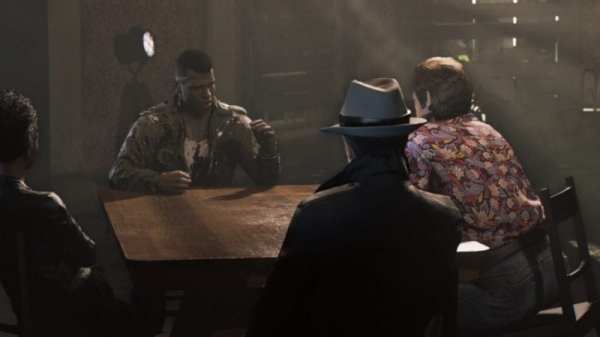Before I was allowed to experience Mafia III, a short tourist guide film about New Bordeaux, Mafia III’s setting, played. This fictional take on 1960’s New Orleans is city full of culture, life, and possibility. At least, that’s what the tourist video wants you to believe. Yet between each praise, the bitter reality of the situation comes seeping through. Behind the lights, blaring jazz music, and beautiful vistas is murder, corruption, and hatred. New Bordeaux is a city at odds with itself and its people, and pulling all the strings are the crime families.
That opening trailer drove one major point home: New Bordeaux is more than just a city, it is a character that is suffering from afflictions inflicted by the very people who live within its confines. New Bordeaux lives and responds to your every action, growing and contracting around you as you help to rid crime, or do a bit of destruction of your own.
In Mafia III you’ll spend your time exploring New Bordeaux’s 10 districts. Each one has its own unique flair and dark secrets. For instance, up in the north we were shown Frisco Fields. This affluent neighborhood is full of beautiful fields and parks, mansions, and politicians. From the outside it looks like a beautiful place to live, but in reality the politicians are in bed with the Marcano family and racism is a driving force throughout the area. You’ll hear racial epithets tossed at you, receive dirty looks, and even be accosted by the law enforcement, a disgusting reminder of the period in which Mafia III takes place, and a reason for the protagonist, Lincoln Clay to push even harder in his fight.
This world, as ugly as its undergoings may be, becomes your playground. Every district, alley, and location reacts to your every move, allowing you to build your empire and take down the mob that betrayed you and your family. Each District is run by an enemy of yours that is just waiting to be overthrown, and that’s when the world opens up to you. Each area has objectives that you can complete to make your mission easier. You can take out drug dens, seize brothels, burn property, interrogate workers, and more.
Of course, this isn’t easy. It would be next to impossible for a single man to take down an entire crime syndicate on his own, but luckily Clay has help. I was shown the Underboss system which gives Clay three subordinates who help run his empire, one of which happens to be Vito Scalleta, the protagonist of Mafia II. You can divvy up your turf between them, unlocking different perks and items that you’ll be able to use in the open world. It’s essentially a way to manage your family and keep things running smoothly. However, just like the city of New Bordeaux, there’s more to the system than immediately meets the eye.
As mentioned above, the world of Mafia III is alive and it reacts to everything you do and the characters within the game follow the same mantra. Being a boss means you have to ensure those under you are content and willing to play nice. If you show too much favor to one of your Underbosses, or if any of them feel ripped off or betrayed, you may have a mutiny on your hands. Having one of your own officers declare war on you could be devastating, especially if you provided them a lot of resources. So you’ll always have to walk a fine line or be forced to put one of your own down in a huge battle.
That same level of choice allows for story missions to feel even more dynamic. Just about everything you do in Mafia III’s open world affects the overall narrative, potentially making every single player’s experience unique. Deciding on whether to use stealth, go in guns blazing, a mixture, or something entirely different will alter how enemies react to you, and what options the world will provide you. Do you sneak in and eliminate a single resource, slowly bringing down a gang? Or do you raise hell and send a message, sparking open war in the streets?
Those wars are filled with visceral brutality as Clay and his constituents take down anyone in their path with absolutely no mercy. Whether you’re using melee or firearms, you can use vicious executions that send crowds running. There seemed to be a lot of different animations, some even dependent on the weapon you were using, showing that the developers, Hangar 13, were not shying away from the true nature of mob violence.
Mafia III drops players into the 1960’s American south for better or worse. It is absolutely stunning in its beauty, yet the contrast of humanity’s dark side and the determination of a man willing to do absolutely anything to get revenge all make for an interesting dynamic that fans should be looking forward to seeing play out. I was worried that Mafia III would be too far of a departure for the franchise, but after finally seeing everything in action, I can say crime shines here in a way that it hasn’t done before.

